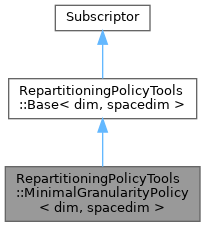 |
deal.II version GIT relicensing-3128-g792dc1c45b 2025-04-23 21:00:00+00:00
|
 |
deal.II version GIT relicensing-3128-g792dc1c45b 2025-04-23 21:00:00+00:00
|
#include <deal.II/distributed/repartitioning_policy_tools.h>

Public Member Functions | |
| MinimalGranularityPolicy (const unsigned int n_min_cells) | |
| virtual LinearAlgebra::distributed::Vector< double > | partition (const Triangulation< dim, spacedim > &tria_in) const override |
| template<class Archive > | |
| void | serialize (Archive &ar, const unsigned int version) |
Querying the observer pointers an object has. | |
| unsigned int | n_subscriptions () const |
| template<typename StreamType > | |
| void | list_subscribers (StreamType &stream) const |
| void | list_subscribers () const |
Static Public Member Functions | |
| static ::ExceptionBase & | ExcInUse (int arg1, std::string arg2, std::string arg3) |
| static ::ExceptionBase & | ExcNoSubscriber (std::string arg1, std::string arg2) |
Private Types | |
| using | map_value_type = decltype(counter_map)::value_type |
| using | map_iterator = decltype(counter_map)::iterator |
Private Member Functions | |
EnableObserverPointer functionality | |
Classes derived from EnableObserverPointer provide a facility to subscribe to this object. This is mostly used by the ObserverPointer class. | |
| void | subscribe (std::atomic< bool > *const validity, const std::string &identifier="") const |
| void | unsubscribe (std::atomic< bool > *const validity, const std::string &identifier="") const |
| void | check_no_subscribers () const noexcept |
Private Attributes | |
| const unsigned int | n_min_cells |
| std::atomic< unsigned int > | counter |
| std::map< std::string, unsigned int > | counter_map |
| std::vector< std::atomic< bool > * > | validity_pointers |
| const std::type_info * | object_info |
Static Private Attributes | |
| static std::mutex | mutex |
A policy that allows to specify a minimal number of cells per process. If a threshold is reached, processes might be left without cells. The cells will be distributed evenly among the remaining processes.
Definition at line 133 of file repartitioning_policy_tools.h.
|
privateinherited |
The data type used in counter_map.
Definition at line 224 of file enable_observer_pointer.h.
|
privateinherited |
The iterator type used in counter_map.
Definition at line 229 of file enable_observer_pointer.h.
| RepartitioningPolicyTools::MinimalGranularityPolicy< dim, spacedim >::MinimalGranularityPolicy | ( | const unsigned int | n_min_cells | ) |
Constructor taking the minimum number of cells per process.
Definition at line 171 of file repartitioning_policy_tools.cc.
|
overridevirtual |
Return a vector of the new owners of the active locally owned and ghost cells.
Implements RepartitioningPolicyTools::Base< dim, spacedim >.
Definition at line 180 of file repartitioning_policy_tools.cc.
|
inlineinherited |
Return the present number of subscriptions to this object. This allows to use this class for reference counted lifetime determination where the last one to unsubscribe also deletes the object.
Definition at line 340 of file enable_observer_pointer.h.
|
inlineinherited |
List the subscribers to the input stream.
Definition at line 357 of file enable_observer_pointer.h.
|
inherited |
List the subscribers to deallog.
Definition at line 200 of file enable_observer_pointer.cc.
|
inlineinherited |
Read or write the data of this object to or from a stream for the purpose of serialization using the BOOST serialization library.
This function does not actually serialize any of the member variables of this class. The reason is that what this class stores is only who subscribes to this object, but who does so at the time of storing the contents of this object does not necessarily have anything to do with who subscribes to the object when it is restored. Consequently, we do not want to overwrite the subscribers at the time of restoring, and then there is no reason to write the subscribers out in the first place.
Definition at line 349 of file enable_observer_pointer.h.
|
privateinherited |
Subscribes a user of the object by storing the pointer validity. The subscriber may be identified by text supplied as identifier.
Definition at line 132 of file enable_observer_pointer.cc.
|
privateinherited |
Unsubscribes a user from the object.
identifier and the validity pointer must be the same as the one supplied to subscribe(). Definition at line 152 of file enable_observer_pointer.cc.
|
privatenoexceptinherited |
Check that there are no objects subscribing to this object. If this check passes then it is safe to destroy the current object. It this check fails then this function will either abort or print an error message to deallog (by using the AssertNothrow mechanism), but will not throw an exception.
Definition at line 54 of file enable_observer_pointer.cc.
|
private |
Minimum number of cells per process.
Definition at line 148 of file repartitioning_policy_tools.h.
|
mutableprivateinherited |
Store the number of objects which subscribed to this object. Initially, this number is zero, and upon destruction it shall be zero again (i.e. all objects which subscribed should have unsubscribed again).
The creator (and owner) of an object is counted in the map below if HE manages to supply identification.
We use the mutable keyword in order to allow subscription to constant objects also.
This counter may be read from and written to concurrently in multithreaded code: hence we use the std::atomic class template.
Definition at line 213 of file enable_observer_pointer.h.
|
mutableprivateinherited |
In this map, we count subscriptions for each different identification string supplied to subscribe().
Definition at line 219 of file enable_observer_pointer.h.
|
mutableprivateinherited |
In this vector, we store pointers to the validity bool in the ObserverPointer objects that subscribe to this class.
Definition at line 235 of file enable_observer_pointer.h.
|
mutableprivateinherited |
Pointer to the typeinfo object of this object, from which we can later deduce the class name. Since this information on the derived class is neither available in the destructor, nor in the constructor, we obtain it in between and store it here.
Definition at line 243 of file enable_observer_pointer.h.
|
staticprivateinherited |
A mutex used to ensure data consistency when accessing the mutable members of this class. This lock is used in the subscribe() and unsubscribe() functions, as well as in list_subscribers().
Definition at line 250 of file enable_observer_pointer.h.